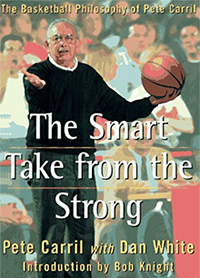Every morning before begrudgingly heading off to work in the sweltering open hearths of Bethlehem Steel, Pete Carril’s father offered his son the same advice: The strong always take from the weak, but the smart take from the strong. Choose to be smart.
 The younger Carril would grow up to be the legendary Princeton basketball coach. His father’s advice would became the driving theme to his innovative coaching philosophies and the eventual title to his 1997 memoir: The Smart Take from the Strong.
The younger Carril would grow up to be the legendary Princeton basketball coach. His father’s advice would became the driving theme to his innovative coaching philosophies and the eventual title to his 1997 memoir: The Smart Take from the Strong.
In last week’s blog, I wrote that good teammates are smart. I’ve been thinking about that assessment in relationship to Carril’s words. What specifically do good teammates do that make them smart? What separates them from the strong and the weak? What is the difference between being intelligent and being smart?
Intelligence stems from our genetic makeup. We are, theoretically, born with this ability to acquire knowledge. Smart is the ability to apply the knowledge we acquire. In terms of team dynamics, smart is a far more useful characteristic. Intelligence is meaningless without application.
Understanding the difference between smart and intelligent allows us to understand what specifically makes a teammate smart:
- Their work ethic
- Their commitment to continuous learning
- Their capacity to take calculated risks
The smart know the value of hard work. They recognize that hard work isn’t just intrinsically virtuous, but that it increases the probability of positive outcomes. When people work toward a goal, they improve the chances of their achieving that goal. The harder they work, the greater the probability. Good teammates have work ethic and a readiness to outwork others.
The smart are committed to continuous learning. They constantly seek new and better ways to operate. They anticipate change and develop improved training methods. Good teammates master their craft by avoiding repeated mistakes and the pitfalls of complacency.
The smart advance themselves through calculated risks. Failure to adapt can be fatal, but so can failure to consider the consequences of our actions. Good teammates strike the right balance of confidence and caution by weighing the risks before they act and by not allowing themselves to be paralyzed by the presence of risk.
Laziness precludes the weak from outworking others or committing to lifelong learning. Risk renders the weak unable to venture from their comfort zones. The weak are not good teammates because they mentally defeat themselves.
Though capable of hard work, arrogance keeps the strong from embracing the need to evolve. The strong are too content to rely on the comfort provided by their strength to self-evaluate, which can cause them to be cavalier in the risks they take. They also mentally defeat themselves.
It’s important to note that the strong can be smart, and so can the intelligent. Being smart is a choice, and so is being a good teammate.
As always…Good teammates care. Good teammates share. Good teammates listen. Go be a good teammate.




